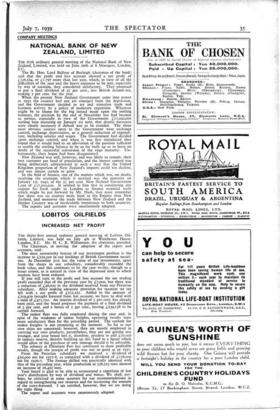COMPANY MEETINGS
NATIONAL BANK OF NEW ZEALAND, LIMITED
THE 67th ordinary general meeting of the National Bank of New Zealand, Limited, was held on June 29th at 8 Moorgate, London, E.C.
The Rt. Hon. Lord Balfour of Burleigh (chairman of the bank) said that the profit and loss account showed a net profit of £106,524, or £1,797 more than last year, which, in view of all the difficulties of the year and the heavy expenses to be met, especially by way of taxation, they considered satisfactory. They proposed to pay a final dividend of 21 per cent., less British income-tax, making 5 per cent. for the year.
When the present New Zealand Government came into power in 1935 the country had not yet emerged from the depression, and the Government decided to try and stimulate trade and business activity by a policy of monetary expansion. Whatever might be to blame for the big inroad made upon the sterling balances, the position by the end of November last had become so serious, especially in view of the Government £17,000,000 sterling loan maturing on January 1st next, that drastic measures were clearly necessary if default was to be avoided. The three most obvious courses open to the Government were exchange control, exchange depreciation, or a general reduction of expendi- ture, including salaries and wages. The Government had decided upon exchange control, and when it was first introduced they hoped that it would lead to an alleviation of the position sufficient to enable the sterling balance to be so far built up as to leave no doubt of the successful conversion of the 1940 maturity. Un- fortunately, their hopes had been disappointed.
New Zealand was still, however, and was likely to remain, their best customer per head of population, and the import control was being deliberately administered in such a way that the United Kingdom proportion of New Zealand's imports could not decline, and was almost certain to grow.
In the field of finance, one of the matters which was, no doubt, receiving the attention which it merited was the maturity on January 1st, 1940, of the 31 per cent. New Zealand Government Loan of £17,000,000. It seemed to him that in considering any request for fresh credit in London to finance essential trade which might be put forward by Mr. Nash, they must remember that there was no country more loyal to the Empire than New Zealand, and moreover the trade between New Zealand and the Mother Country was of incalculable importance to both countries. The reports and accounts were unanimously adopted.










































 Previous page
Previous page